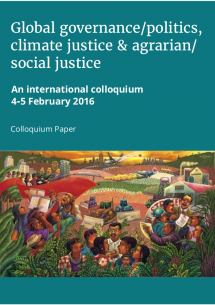Neoliberal Sustainability? The Biopolitical Dynamics of “Green” Capitalism Colloquium Paper No. 31
“Sustainable citizenship”: To what extent is such an idea and promotion of sustainability actually sustainable and can it contribute to decreasing climate change? Or can and should it rather be dismissed as a neoliberal strategy to control consumers and their choices? And which subjects do actually get such citizen responsibilities?

Downloads
Authors
This paper explores the various discursive strategies that are employed by governments and corporations to stimulate sustainability on an individual level. It critically examines the notion of “sustainable citizenship”: the idea that individuals should increase social justice and safeguard nature through individual and collective practices (Micheletti, 89).
Big corporations, celebrities and activists certify consumer products as a way to take responsibility for (food) production and consumption in a sustainable way. Such activities increasingly reflect the ways in which individual citizens can, and are expected to, become caretakers of the planet in their daily lives. This is for instance reflected in current trends such as eating organic, local and Fair Trade, and in supermarket campaigns to be more sustainable. Such campaigns seem to urge individuals to become sustainable and responsible actors in contributing to the well being of our “Mother Earth”, but only in a manner that seems to be tightly interwoven with neoliberal capitalist agendas, as this paper will explore.
To what extent is such an idea and promotion of sustainability actually sustainable and can it contribute to decreasing climate change? Or can and should it rather be dismissed as a neoliberal strategy to control consumers and their choices? And which subjects do actually get such citizen responsibilities?
These and other questions will be explored in this paper through the notion of “biopolitics” as conceptualized by Michel Foucault, to look at governing practices, while additionally shifting focus to the actual subjects and actors that are affected by climate change and often left to die.
Moreover, in order to move towards a less daunting approach to these pressing issues this paper will bring in feminist approaches, such as Isabelle Stengers’ “cosmopolitical proposal” as a possible entry point and lens onto the contemporary issues of climate change, environmental degradation and the idea of sustainability
* This paper was published as part of the 2 day Colloquium Global governance/politics, climate justice & agrarian/social justice and selected for republishing on the TNI website. All papers can be found at the website of ISS.